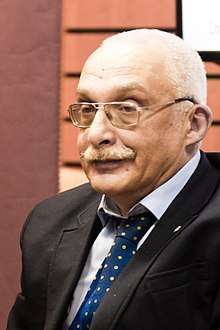Alexander Drouz
Aleksander Abramovich Drouz (Russian: Алекса́ндр Абра́мович Друзь, 10 May 1955, Leningrad, USSR) is a prominent veteran contestant of the Russian TV gameshow What? Where? When?, first of the currently five "Magisters of the Game"; Vice-President of the International Association of Clubs What? Where? When?, director of the Saint-Petersburg branch of the What? Where? When?

Biography
Aleksander was educated at a prestigious Leningrad school specializing in mathematics and physics, now known as the Saint Petersburg Lyceum 239. In 1975, he finished the Leningrad College of Industrial Education, and in 1980 graduated from Leningrad Institute of Engineers of Railway Transportation, now named St. Petersburg State Transport University (see also ...#Graduates), specializing in the field of "electronic computing machines" (EVM).[1]
Aleksander Drouz is a certified systems engineer.
What? Where? When?
He first appeared as a contestant on What? Where? When? in 1981 and his active participation in the gameshow has been uninterrupted since then. He holds a record for the longest uninterrupted participation in the TV version of What? Where? When?. He also holds a current record on the number of the conducted TV games (92) and victories (56).
He was awarded a "Crystal Owl" as the best player of the intellectual club (1990, 1992, 1995, 2000, 2006, 2012). In 1995, he was named the first "Magister of the Game" in the show's history. Since then, four other prominent veterans of the game also became bearers of the title, namely Maxim Potashev, Viktor Sidnev, Andrey Kozlov and Elizaveta Ovdeenko. As of 2014, Alexander Drouz is the 3 times WWW World Cup Champion.
He was captain of the What? Where? When? team «Transsfera» (sporting version of the game), which he led to victory at the 1st World cup (2002). The team also won the "Mayor of Saint Petersburg" Cup in sporting What? Where? When? nine times in a row.
Aleksander Drouz was champion of the TV show Brain Ring (a gameshow closely related in principle as well as personnel to What? Where? When?) in 1990, 1991, 1994, 2010. He also twice became a champion in another intellectual Russian TV gameshow Svoya igra (1995, 2003).
Television
Author and anchorman of intellectual gameshows and other programs on various Russian TV channels.
Other projects
On 5 April 2008, Aleksandr Drouz became one of the Russian torchbearers of the 2008 Summer Olympics torch relay, along with numerous members of government, famous athletes, film stars and artists.[2]
In 2015, he participated in the McHappy Day charity event designed to raise money for the treatment of sick children[3].
In 2016, he worked as a taxi driver in the St. Petersburg company “Taxovichkof” as part of a charity event, all the funds raised from which were transferred to the AdVita charity fund that helps cancer patients[4].
In 2017, he starred in a commercial in support of a sober lifestyle[5].
In 2018, he took part in the project of the Warm House charity fund, which helps families in crisis situations[6].
Drouz is married and has two daughters: the elder Inna Drouz and the younger Marina Druz. Both daughters have followed in their father's footsteps and participated in the "What? Where? When?" program. Inna especially was both very active and successful in the game.[7]
References
- Официальный сайт первого магистра игры «Что? Где? Когда?» Александра Друзя — биография
- КП: Олимпийский огонь понесут Друзь, Фрейндлих и Плющенко
- Ургант и Друзь пошли работать в Макдональдс
- Александр Друзь стал водителем такси в Санкт-Петербурге
- Александр Друзь для трезвых
- Планы на добро: Благотворительный аукцион керамики и лекция о счастье | Благотворительность | Общество | Аргументы и Факты
- Вечерний Ургант. Александр Друзь в гостях у Ивана Урганта (26.05.2015)